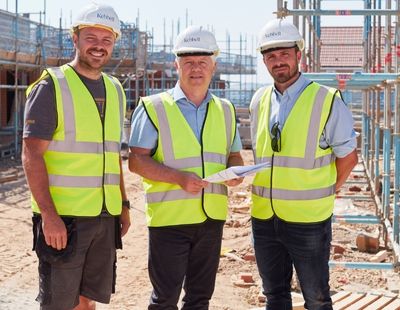I am the Northern Regional Development Director for Kebbell, based in North Yorkshire, which means I look after the region’s construction and commercial elements, from land buying to budgeting to health and safety. I suppose I am the glue between what happens on site and the marketing and sales team. I was lucky to be made a construction director quite quickly and have worked at Kebbell for 25 years.
What made you want to become a Construction Director?
I am now 60 and have only ever had two jobs throughout my life. My previous company was a major housebuilder, but they were taken over by another business. I was presented with an opportunity to join Kebbell which ticked all my boxes from quality of the build to the family element of the business. I love to meet different people all the time and the variety of the work. I also love to see from start to finish the build of a high-specification home and how rewarding it is when you hand over the keys to someone’s dream home.
What skills do you need to be a Construction Director?
I think it helps to be personable. You need lots of contacts and to be able to maintain your network with a good reputation. I don’t fall out with people, but I think I am respected by everyone I deal with including when we partner with other companies. I get involved with so many different things and no two days are the same, so you have to wear lots of different hats for the various disciplines.
I know that family values in business are very important to you. Why is that?
Family values are everything to me and that is what attracted me to join Kebbell all those years ago. Having a family ethos at work means to me, looking after your sub-contractors, consultants, and colleagues, being valued and listened to, and feeling part of something. The turnover of staff is frightening at other housebuilders, but apart from when people retire, more or less every colleague chooses to stay at Kebbell.
I heard your two sons are also working at Kebbell – what are their roles and what is it like to be working with your family?
Nathan is a Northern Site Manager currently based at Cornelian Fields in Scarborough. He came through the technical side of the business, but ended up working in on-site management and has been employed directly by Kebbell for eight years now. He must love it because he drives three hours everyday to get here and back! There is lots of work on his doorstep near his home, but he chooses to work for us.
Dale is a sub-contractor carpenter on the site and did his apprenticeship with Kebbell. He is an unbelievably brilliant craftsman. He and his work partner employ another three other carpenters and manage their business themselves but see Cornelian Fields as their main job and where they love to be. They like the way the site is organised and are well looked after, such as being paid fortnightly as opposed to every 90 days which regularly happens at other housebuilders.
What are you working on at the moment?
I work mostly on Cornelian Fields in Scarborough because it is such a big project. We are just starting the fifth phase and have millions of pounds of infrastructure going in at the moment with a potential of 10 phases in total. Phase five has slightly bigger and more detached houses than the previous phases. I am also involved in other potential developments going through planning, especially around Harrogate.
How long do you stay on a project at any one time?
The norm to stay on a project I suppose is up to three years, but it really obviously depends on the size. 25 years ago Mr Kebbell Senior came to me and said “Come on, I will show you Scarborough”. We stood at one point at the site and he said “You will retire here!” It took ten years to get through planning from that point with work starting in 2013. I will hopefully still be here in 2030 when maybe the development will be finished!
What are the biggest issues facing the property industry at the moment from your point of view?
The biggest issues are the supply of materials, the availability of tradespeople, the inflated costs including fuel and the fact that working from home makes it very hard to get hold of engineers, planners, utilities and safety consultants! There is up to a 60% increase in prices and if we don’t pay that – someone else will. There is a ceiling for everything when you take off the costs against the selling price because then the margin disappears. My sons Dale and Nathan are spending an extra £125 on fuel each week at the moment and they aren’t alone in that!
What are the best and hardest things about the job?
The best part of the job is seeing the finished product. I love seeing it when it is a flat site and then visualising it as complete. I enjoy having the influence to contribute to the specification and knowing that nothing is faddy about what we do as we always have longevity in mind. Sometimes I go back to a former development a couple of years later and enjoy seeing it mature and thriving. I could never do a job where I hate to get up every morning to go to it. The hardest thing about the job, at the moment anyway, is the budgeting with all the costs constantly changing.
Tell me about your typical day?
I am an early riser and get up at around 6am. Work begins on site at 8am so I start taking phone calls early in the morning. I take the dog for a walk, have a cup of tea, and reply to emails that need urgent answers. I find phone calls are better at solving problems than emails. I am out on-site at least twice a week, but the beauty of the job is I don’t have a set routine. I am constantly meeting up with different colleagues in various disciplines, looking at other potential new sites and making sure everything is in order. Sometimes if I leave at 5pm I won’t get home until 7pm and then I unwind.
As I mentioned family is everything to me. I have been with my wife since we were 14 and we have three grown-up kids and two grandkids. Our eldest grandson stays at least three nights a week as our daughter-in-law is a nurse. Weekends are all about the family. Well, family and football! Our kids are super talented footballers - Nathan was a professional footballer, Dale was also very good and our daughter played in a women’s super league.
How important is considering environmental issues compared to 10 years ago?
The environment is top of the planner’s agenda now, in particular biodiversity net gain, but this was always important for our own internal planning process. We like to build in the leafy suburbs and inevitably there will be restraints such as habitats, but if done properly we can enhance the area rather than take from it.
What has been your proudest moment at work?
I have 25 years of pride in my work. I love working with our CEO Nick Kebbell on really special developments on unique sites. Scarborough is an ongoing source of pride. I am proud that I am trusted to make major decisions. I have also always been keen on technology and that was something I have helped really develop at Kebbell.
Finally, what do you think makes a home a home?
A home has to cater for whoever is going to live there and they have to be able to function well and thrive. The hubs of the home are the kitchen and family areas because that is where you are together with others. Having an indoor/outdoor opportunity, where you can throw open the garden doors is increasingly and rightly in demand. A home can also be a workplace now. A home needs to feel part of you and your family.
*With thanks to Kebbell for providing us with this article























Join the conversation
Be the first to comment (please use the comment box below)
Please login to comment